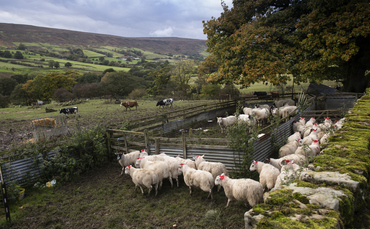

Supporting farmers to manage land to expand carbon sinks offers a far cheaper route to net zero than scaling up bioenergy with carbon capture technologies, Green Alliance study argues
Paying or incentivising farmers to plant new woodlands, restore peatlands, and create other forms of nature-based carbon sinks would be hundreds of billions of pounds cheaper than relying heavily on carbon capture technologies to reach net zero emissions in the UK, fresh research by Green Alliance has today argued.
A new report by the think tank claims the UK can achieve its statutory net zero emissions targets for the land-use sector by supporting farmers and land managers to create healthy natural carbon sinks, such as woodlands, peatlands, and soils.
Such an approach could also significantly benefit British farmers, potentially improving incomes for almost two-thirds of UK farmers, while also helping to reverse the decline of UK wildlife, according to Green Alliance.
However, creating enough natural land-based carbon sinks to support the UK's wider climate goals would require a significant shift in how farmland is used in the UK.
The report estimates around 10 per cent of the UK's least productive farmland would need to be managed for carbon and nature - such as wetlands, woodlands and extensively grazed grasslands - by 2030, up from just a fraction today. The share of least productive agricultural land returned to nature would then need to increase to more than a third by 2050, according to the study.
Meanwhile, the report estimates farming using agroecological methods would also need to increase from covering three per cent of farmland today, to around 60 per cent over the next three decades, in order to deliver on the UK's climate targets.
But failing to build and restore these natural carbon sinks could see the UK pay a far bigger penalty, forcing the country to import large quantities of biomass, including wood pellets, to generate negative emissions from bioenergy with carbon capture and storage (BECCS), it warns.
The report estimates relying on BECCS would be a highly risky and expensive move, potentially adding as much as £100bn to taxpayer costs for delivering net zero emissions by 2050 in the UK.
It comes after further details of the government's green farming subsidy scheme were unveiled earlier this month, setting out plans to increase payment rates to farmers for providing environmental services - such as woodland creation and soil improvement efforts - under its Sustainable Farming Incentive and Countryside Stewardship programmes.
However, the government is facing growing pressure to flesh out its broader vision for slashing emissions from land-use and agriculture, amid accusations that at present the UK lacks a clear climate plan and targets for sector. There are hopes further details and ambitions could emerge in a refreshed Net Zero Strategy, which the government has been ordered by the High Court to produce by the end of March.
Lydia Collas, policy analyst at Green Alliance, said the UK had the opportunity to be "genuinely world leading in restoring nature and supporting net zero farming", but that the government should focus on incentivising farmers to prioritise nature-based solutions rather than relying too much on technological fixes to achieve the UK's climate targets.
"We need a plan to make a success of how we use land to restore nature, cut carbon, and grow food," she said. "Our report shows that the government has a choice to make. It can support farmers to store carbon and reverse the decline in nature by creating lots of new natural habitats, or it can throw billions at bioenergy."
The report comes at the end of a week that has seen the debate over the relative merits of nature and technology based carbon removals reignited, following a series of reports in the Guardian newspaper questioning the credibility of tropical forest based carbon offset credits and a new study from Oxford University arguing that a huge increase in carbon removal capacity is required to deliver on global climate goals.
* This article was originally published here
Comments
Post a Comment